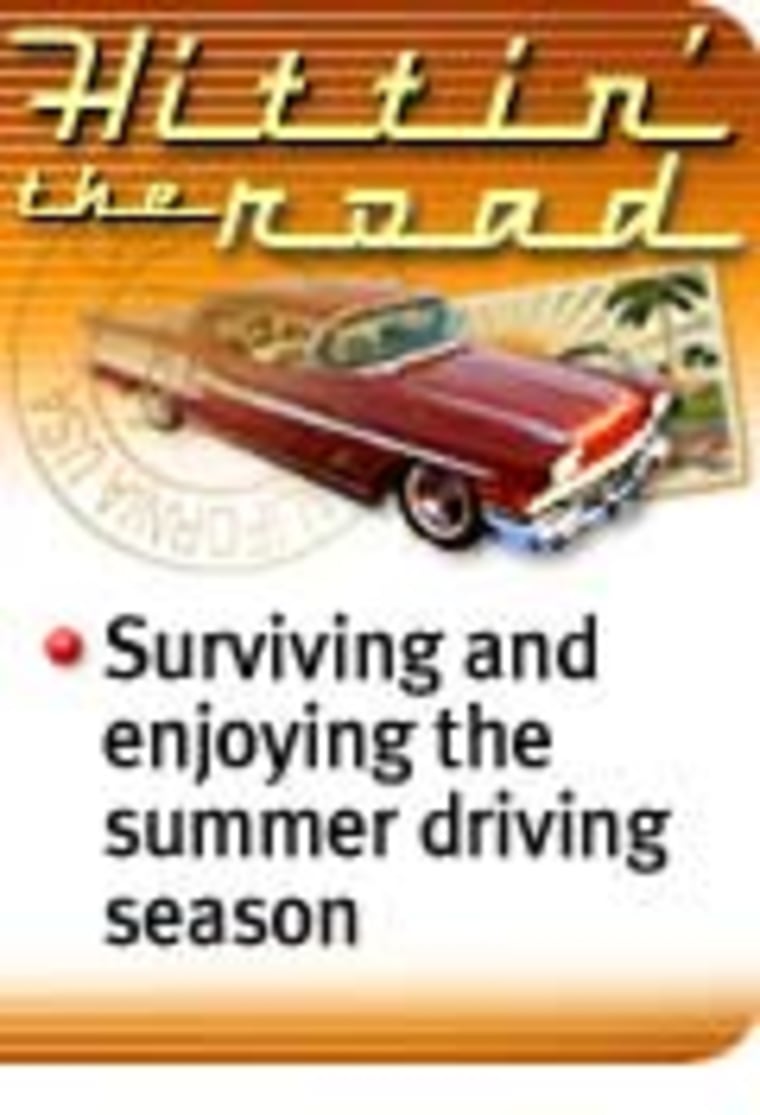With the oil freshly changed, tires rotated and cooling system checked, your car is in tip-top shape for the long haul of a summer road trip. But what about you? From drowsiness caused by common medications to poor distance vision, your health can make you a highway hazard.

EXPERTS SAY healthy drivers make safer drivers so before you pack up the kids and the car, make sure your body is ready for the journey.
DROWSY DRIVING
If you’re like most people, you stay up late packing the night before a road trip. But experts say this is a potentially dangerous practice: A tired driver can be as dangerous as a drunken one. The National Highway Traffic Safety Administration estimates that about 100,000 car accidents each year are caused by drivers falling asleep behind the wheel.
Getting the recommended eight hours of sleep before going on a long trip is important, according to Stephanie Faul, a spokesperson for the American Automobile Association (AAA) Foundation for Traffic Safety. “A person who is well-rested is a safer driver — they’re more alert and make better decisions,” she says.
A study last year by researchers at the University of North Carolina Highway Safety Research Center zeroed in on risk factors for fall-asleep car accidents. In addition to driving late at night, working the night shift or juggling multiple jobs, sleep deprivation and taking medication were common elements in the crashes.

People who have trouble sleeping at night or suffer from daytime drowsiness may have a sleeping disorder that impairs driving and should consult a doctor, says Jane Stutts, the study’s lead author.
Faul urges drivers to plan enough time for the trip to allow for frequent rest stops. “Regular breaks are important every couple of hours. If you sit still for a very long time you become tired. So stop and look at a local attraction,” she says.
If you realize you’re sleepy once on the road, Stutts suggests this short-term fix: “Pull over [in a safe place] and drink two cups of coffee then take a brief nap — 15 to 20 minutes — and after you wake up, walk around the car a few minutes before getting back on the road.”
AUTOMOBILE = HEAVY MACHINERY
Drinking alcohol or using mind-altering drugs are the most obvious routes to hazardous driving, but prescription and over-the-counter medications are also common culprits. Stutts says her study showed that people in sleep-related crashes were more than four times as likely to be taking medication as others.
Richard Miyoshi, a pharmacist at Harborview Medical Center in Seattle and clinical associate professor of pharmacy at the University of Washington, urges people to read drug labels and keep an eye out for warnings of drowsiness, slowed reaction time or vision impairment.
However, Faul notes, sometimes the message on the label just doesn’t register: “If you are taking any medication that says do not operate heavy machinery, that doesn’t just mean a tractor — it means your car.”
Among the riskiest medications are over-the-counter antihistamines used for cold or allergy symptoms, Miyoshi says.
A study published last year in the Annals of Internal Medicine found that over-the-counter allergy medicines containing diphenhydramine, a sedating antihistamine commonly known as Benadryl, can impair driving more than drinking alcohol.
Other common medications that can cause drowsiness or slowed reaction times include muscle relaxants, anti-anxiety drugs, older tricyclic antidepressants, painkillers with codeine, anti-psychotics and blood pressure drugs, he says.
“The effects of medications are very individual — pay attention to how they make you feel — and if they make you feel drowsy, don’t drive,” Miyoshi says.
Miyoshi also warns people who will be boating this summer that agents used in sea sickness patches can cause people to see halos around headlights, making night driving dangerous. Impaired night vision has also been reported by people using the acne drug Accutane.
Stutts notes that a higher proportion of crashes occur in the first couple of days after starting a new medication. Also, if you are taking more than one medication at a time be aware that side effects can be amplified, she adds.
PHYSICAL LIMITATIONS
Whereas antihistamines and painkillers can cause drowsiness, the underlying medical conditions also can impair driving. For instance, sneezing triggered by allergies while driving can be dangerous and chronic pain can limit motion needed for maneuvering a car.
Other conditions that can impair driving include heart conditions, Parkinson’s disease, epilepsy, diabetes, chronic pain, injuries, Alzheimer’s or other forms of dementia, and arthritis or other joint problems. People with such conditions should discuss with a doctor how their driving can be impacted.
“People need to be aware of their limitations,” says Dr. Scott Fields, professor and vice chairman of family medicine at Oregon Health and Sciences University in Portland.
Fields says problems can arise when travelers get out of their routines and forget to take care of themselves. For example, among diabetics, eating poorly while on the road or forgetting to take medication can cause changes in blood sugar that can result in light-headedness and confusion.
Maintaining an exercise program is also important. People often think of driving just as a mental task, Faul notes, but it’s quite physical.
“People who exercise will be better able to control wheel and pedals, especially for older people. Having good leg muscle and arm muscle control is important,” she says.
EYES ON THE ROAD
About 90 percent of sensory clues in driving come through the eyes, so driving with poor, uncorrected vision is a surefire way to endanger yourself and others on the road.
“If you find yourself missing your exit on the highway because you can’t read the sign in time, that means get your eyes checked,” says Dr. Harry Knopf, associate professor of clinical ophthalmology at Washington University School of Medicine in St. Louis.
Most problems with distance vision can be corrected with glasses. If eyeglasses are prescribed, keep them up to date by letting your doctor know as soon as they aren’t working well, Knopf says. Also make sure you have your peripheral vision and depth perception checked. They can decline over the years, increasing your risk of being involved in a collision. Cataracts, glaucoma and diabetes, which also tend to come with age, can have blinding effects.
Also as we get older, we lose optic nerve fibers and and the lens of the eye becomes thicker and darker — changes that become more problematic when it’s dark out. “It’s like wearing sunglasses at night,” Knopf says.
Thickening of the lens can also make older people more sensitive to glare from headlights. A 55-year-old takes eight times longer to recover from glare than a 16-year-old, according to the AAA Foundation for Traffic Safety, which urges people with night vision troubles to avoid driving after dark.
TIME TO RELAX
Now that your body is primed for driving and you’ve hit the road, what’s next?
It’s time to relax. Just as being healthy makes for a safer, happier road trip, a relaxing vacation makes for a healthier, happier you.